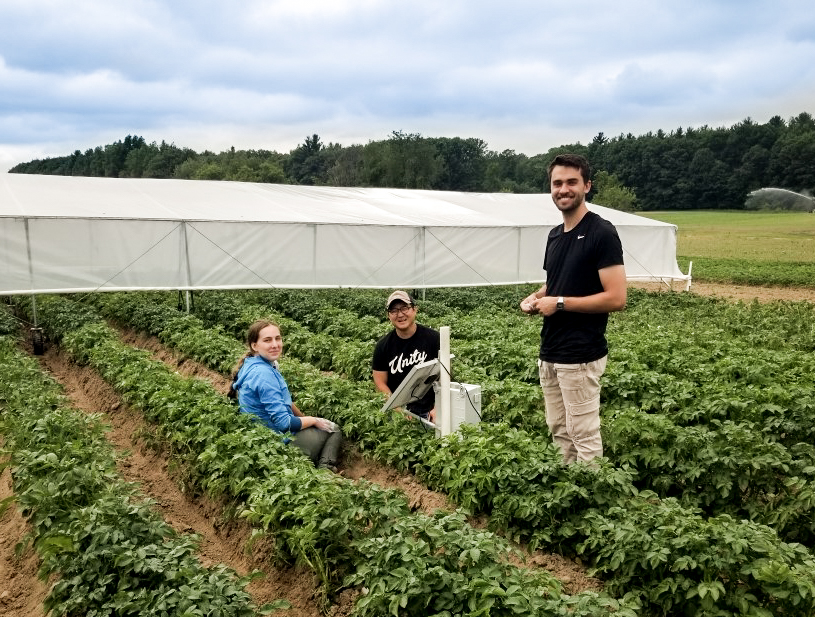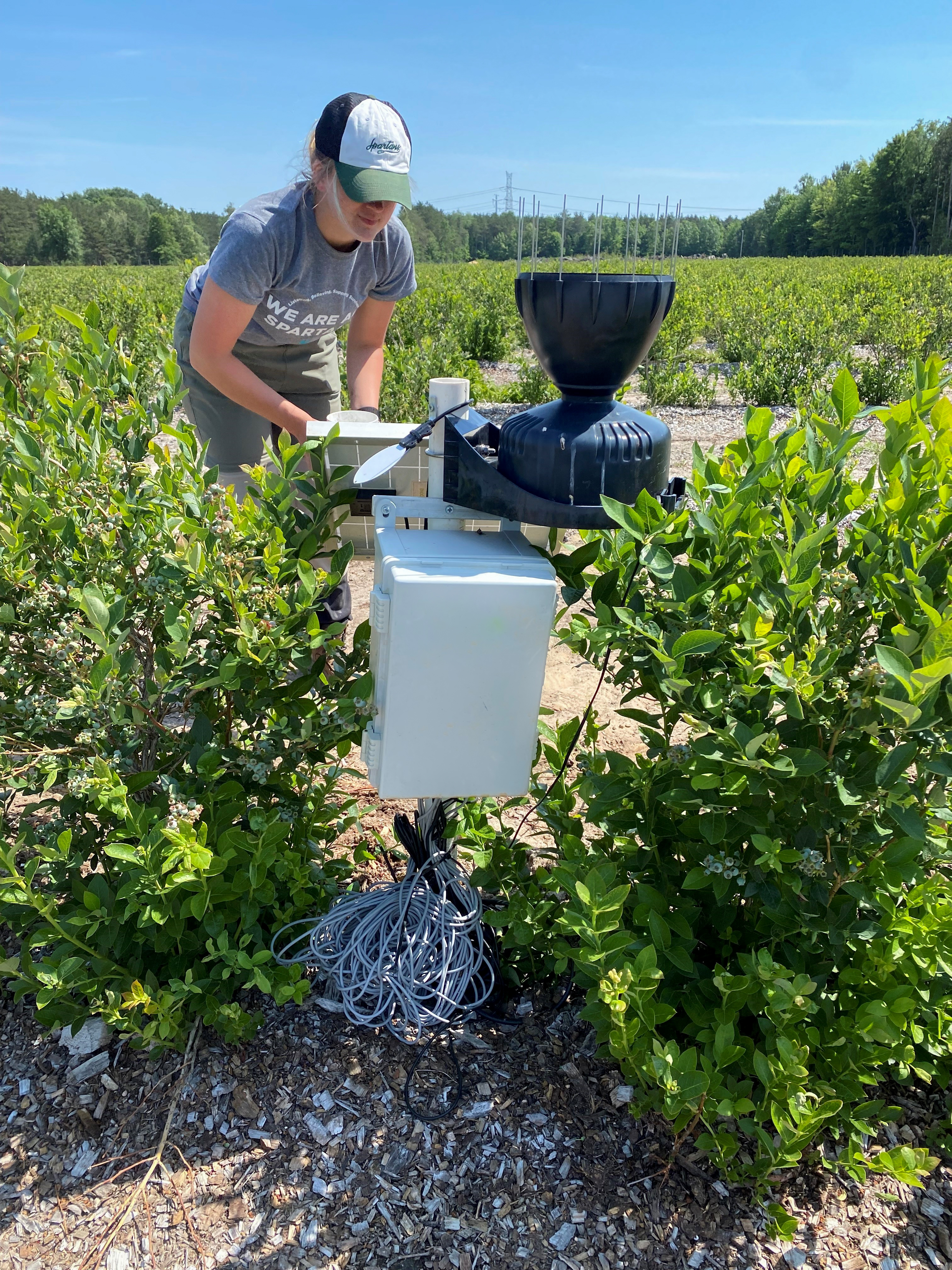Using Precision Agriculture to Adapt to a Changing Climate
Michigan specialty crops have been the research focus of Younsuk Dong, Ph.D., BAE assistant professor. Dong's Low-Cost Monitoring System assists producers across Michigan in adapting to the challenges.

April 24, 2023
Michigan's specialty crop indu stry is the second most diverse in the United States, second only to California. In 2020, Michigan was the top producer of 15 commodities, according to the United States Department (USDA) National Agricultural Statistics Service (NASS). Michigan specialty crops have been the research focus of Younsuk Dong, Ph.D., Michigan State University (MSU) Biosystems and Agricultural Engineering (BAE) assistant professor. Farmers across specialty crop industries face increasing challenges from changing weather patterns, higher temperatures, and inconsistent rainfall due to climate change. Dong's Low-Cost Monitoring System (LOCOMOS) assists producers across Michigan in adapting to the challenges. Dong works on many projects related to increasing yield and reducing diseases in specialty crops. A key element is placing water in the right place at the right time.
stry is the second most diverse in the United States, second only to California. In 2020, Michigan was the top producer of 15 commodities, according to the United States Department (USDA) National Agricultural Statistics Service (NASS). Michigan specialty crops have been the research focus of Younsuk Dong, Ph.D., Michigan State University (MSU) Biosystems and Agricultural Engineering (BAE) assistant professor. Farmers across specialty crop industries face increasing challenges from changing weather patterns, higher temperatures, and inconsistent rainfall due to climate change. Dong's Low-Cost Monitoring System (LOCOMOS) assists producers across Michigan in adapting to the challenges. Dong works on many projects related to increasing yield and reducing diseases in specialty crops. A key element is placing water in the right place at the right time.
According to the Michigan Potato Commission, the Michigan potato industry contributes over $1.24 billion to Michigan's economy, including more than 3,000 jobs. Dong has received a $23 thousand grant from Michigan Potato, looking at irrigation timing in 2023 using the LOCOMOS system. The project will consider the potato variety and soil conditions when determining the appropriate watering rate.
As climate change continues to impact the weather patterns and the world population continues to grow, water use and water management practices are becoming increasingly critical. said Kelly Turner, Ed.D., CAE, Executive Director of Michigan Potato. The work that Dr. Dong is doing provides prescriptive techniques for each field and unique crop for growers to efficiently use the precious water resources we have in the state without causing an adverse impact on the water resource. Carefully using the water resource while ensuring the crop has the water needed to have high yields helps the industry to reduce carbon footprints while efficiently growing healthy, nutritious, food for the people of this nation who rely on the ag industry to feed their families. Every water use sector has an obligation to ensure that they are using the resource responsibly and employing all the conservation techniques and best practices so that MI can remain an oasis for the nation. The work Dr. Dong is doing sets the industry up to achieve the high bar standards that have been set by using his practical technology.
Water conservation is a goal for many farming industries. Not only is conserving water good for the environment, but it can reduce a farmer's water bill and give consumers peace of mind that they are purchasing products that were produced with mindful water use. This project continues a previous project Dong worked on, where they focused on disease in irrigated fields.
According to the USDA NASS, Michigan ranked 5th in the United States for blueberry production in 2020. Dong is leading a project in collaboration with Michigan Blueberry. About 80% of blueberr y production is under irrigation, and farms traditionally do not irrigate on a schedule. Higher temperatures and more erratic precipitation have caused plants not to produce as efficiently as possible.
y production is under irrigation, and farms traditionally do not irrigate on a schedule. Higher temperatures and more erratic precipitation have caused plants not to produce as efficiently as possible.
'the Michigan Blueberry Commission appreciates and supports the innovative and important work that Dr. Younsuk Dong is doing to improve water and energy efficiency. said Nancy Nyquist, Executive Director of the Michigan Blueberry Commission. Water is such an important resource and we are hopeful that this work will also help improve yield, fruit quality and reduce irrigation costs.
Dong has taken his LOCOMOS system and uses sensors to monitor the conditions of the soil to provide recommendations to the farms to improve irrigation schedules. This would allow farmers to adjust their irrigation patterns in real time and deliver precisely what the plants need.
"We are currently working on integrating Artificial Intelligence (AI) and LOCOMOS to increase the accuracy of irrigation water management and better predict the crop water requirements, supported by ProjectGREEEN." said Dong. "We hope that this precise irrigation algorithm can help increase the resilience of specialty crop production to climate change."
Younsuk Dong would like to thank the following individuals for collaborating on Michigan blueberry and potato projects. Jaime Willbur, Assistant Professor in Potato and Sugar Beet Pathology, Jill Check, PhD Student, Martin Chilvers, Associate Professor in Field Crop Pathology, Chris Long, Potato Specialist, Casey Carr, Agronomist at Sackett Potato, Cheyenne Sloan, Small Fruit Extension Coordinator, Carlos Garcia-Salazar, Fruit Extension Educator, Lyndon Kelley, Irrigation Extension Educator, Josh Vanderweide, Assistant Professor in Small Fruit Program, Molly Sears, Assistant Professor Agricultural Economist, and Bill Groenik, Michigan Blueberry Grower Marketing.



 Print
Print Email
Email


